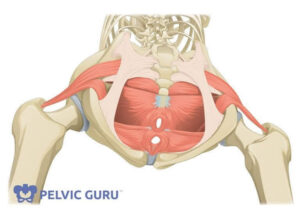
What Does a Pelvic Floor Physical Therapist Do?
What is a pelvic floor physical therapist and what do they actually do? How do they help people and their health? Who can they help? A pelvic floor physical therapist is a physical therapist who specializes in all things pelvic floor. But to properly understand what that means, let’s take a look at the pelvic floor, and how this part of the body affects many different aspects of a person’s life.
What is a Pelvic Floor?

All body types have a pelvic floor. The pelvic floor is the group of muscles that are located from the front of the pubic bone to the back of the tailbone. These muscles are very important because they support essential organs and their functions. These organs include the bladder, the bowel, and in some people, the uterus, fallopian tubes, clitoris, prostate, and testicles. Openings such as the urethra, the rectum, and/or the vagina pass through the pelvic floor muscles. The pelvic floor muscles allow you to control the release of bodily waste (such as urinating) from the body through such openings. The pelvic floor muscles also provide stability for the body’s pelvis, lower back, and hips; and also play an important role in sexual function.
If a problem occurs with the pelvic floor muscles (such as being unable to properly relax these muscles, having high tension in the muscles, or the muscles needing strengthening), many issues may arise. This is referred to as pelvic floor dysfunction. Some symptoms a person may experience include:
- Trouble evacuating or finishing a bowel movement
- Urine leakage
- Pain during sex
- Erectile dysfunction
- Frequent or painful urination
- Lower back pain
- Pain in the pelvic region
These issues do not go away on their own and should be diagnosed by a pelvic floor physical therapist. Another important issue related to the pelvic floor is pelvic organ prolapse. This is when the pelvic floor muscles can no longer support the organs above it, resulting in the drop (prolapse) of such organs from their normal position.
As you can see, the pelvic floor serves an important function in the body, and without its proper function, many complex conditions or symptoms may occur. In order to properly maintain the healthy function of the pelvic floor, or to solve possible symptoms or conditions of the pelvic floor, a person should rely on the knowledge and practice of a pelvic floor physical therapist.
Expertise of a Pelvic Floor Physical Therapist
A pelvic floor physical therapist will have a very thorough understanding of the pelvic floor and physical therapy.
Pelvic floor physical therapists enter schooling for many years to earn a degree in the field of physical therapy; usually earning their bachelor’s in about four years, and doctorate’s after another three years. They will also complete a licensing process in order to legally diagnose and provide treatment, which involves passing a national exam. In addition to earning such degrees and becoming licensed, those who want to specialize in pelvic floor physical therapy (and therefore be a pelvic floor physical therapist) will go through additional education and training that are specific to learning about all things pelvic floor related. They will eventually begin practicing and gaining even more experience in their field.
Another important aspect of a physical therapist is communication, and the ability to make their patients feel comfortable and welcome in their space. Due to the location and nature of the pelvic floor, as well as the issues or symptoms that can arise from it, seeing a doctor on such matters can be a little scary and perhaps embarrassing to some. However, it does not have to be. A pelvic floor physical therapist has quite a lot of familiarity with such topics, and should always encourage honesty and open communication about pelvic floor topics. Nobody should ever feel shame for seeking personal health assistance, and it is completely okay and normal to be a bit nervous when seeking medical assistance.
How Can a Pelvic Floor Physical Therapist Help?
A pelvic floor physical therapist will communicate with their patients to get a full understanding of their medical history and the symptoms they are experiencing, and possibly provide a physical exam. Because every case is different and everyone’s body is different, the pelvic floor physical therapist will create individualized care for each patient.
Pelvic floor physical therapy involves the reconditioning of the pelvic floor muscles in order to improve the strength, flexibility, and function of the muscles. The pelvic floor physical therapist may manipulate and mobilize the pelvic floor muscles, teach pelvic floor exercises, and train the patient how to coordinate and be aware of these muscles with their daily activities. They may teach exercises to help with relaxation, assist in stretching of the body, and self-management education.
Internal therapy is an option as well. However, not everyone is comfortable with receiving such treatment, which is perfectly normal; a pelvic floor physical therapist will work with every individual’s personal needs and perhaps turn to other forms of treatment if necessary. An example of internal therapy is the use of vaginal dilators. These are therapeutic aides used to help people stretch and retain their muscles in the vagina or rectum.
Who Can Benefit from Seeing a Pelvic Floor Physical Therapist?
Pelvic floor physical therapy has many benefits. As mentioned before, it can help people with certain conditions such as pelvic floor dysfunction or pelvic organ prolapse. However, it can also help others with a variety of different medical histories or conditions. Pelvic floor physical therapy can help solve and prevent a variety of long-term conditions.
A pelvic floor physical therapist can assist pregnant people during and after their pregnancies to maintain a healthy body for both the birthing person and the baby. Pelvic floor physical therapy will assist in preparing the body for childbirth as well as recovery postpartum.
Pelvic floor physical therapy can also benefit people with endometriosis, vaginismus, premature or painful ejaculation, and those who recently received pelvic floor surgery.
Working with a Pelvic Floor Physical Therapist: Dr. Laura Meihofer
Dr. Laura Meihofer specializes in all things pelvic floor. She has gained experience with a variety of cases through years of patient care, as well as during her education and research while earning her doctorate at the Mayo Clinic in Minnesota. She offers inclusive patient care, treating all gender identities and conditions relating to the pelvic floor; and works to create a safe space to discuss and learn about common pelvic floor conditions. She ensures a professional but accessible experience for all her patients; challenging the status quo to diminish shame and instead create courage and vulnerability in topics that are typically considered taboo.
Dr. Laura is passionate about creating accessible resources, education, and products for individuals suffering from pelvic floor conditions, in order to help them work towards a better quality of life.
If you feel that would benefit from pelvic floor physical therapy or think you are experiencing symptoms that may require diagnosis, you can book a FREE 20-minute consultation HERE.
Or, if you’d like to learn more about all things pelvic floor health, head over to Instagram! You can always reach out in the DM’s if you have any questions!
More content you may like:
Some of the links on this page may be affiliate links. Laura Meihofer’s LLC is a participant in the Amazon Associates Program and others, as an affiliate advertising program designed to provide a means for sites to earn advertising fees by linking to products Laura organically uses and trusts. If you purchase a product through an affiliate link, your cost will be the same, but Laura will automatically receive a small commission. Your support is greatly appreciated and helps her spread her message!








Sorry, the comment form is closed at this time.